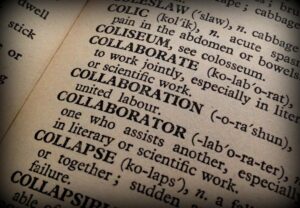On August 18, 2017, Governor Rauner signed into law Public Act 100-0205 which became the Illinois Collaborative Process Act. The Act took effect on January 1, 2018 and legislatively authorizes the collaborative divorce practice in Illinois. The Act is codified at 750 ILCS 90.
What is Collaborative Divorce?
Collaborative divorce is a legal process which allows couples who want to end their marriage to work with lawyers but to avoid the uncertainty and costs of litigation. Advocates of collaborative divorce argue that the process allows parties to achieve settlement that better meets the specific needs of both parties and, if applicable, their children.
The process is voluntary and no court can order parties to enter the collaborative process. The process starts when the parties sign an agreement to enter into the collaborative process. The lawyers who participate in the process are precluded from representing either party in litigation on the same matter.
The collaborative process can be used to facilitate a broad range of family law issues, including divorce, allocation of parenting time and responsibilities, support and pre- and post-nuptial agreements. If you are interested in the collaborative process, the attorneys at Allison & Mosby-Scott can help. Please visit our website or call us at 309-662-5084.
The Illinois Collaborative Process Act
Section 5 of the Act defines the following terms (750 ILCS 90/5):
- “Collaborative process communication” means a statement, whether oral or in a record, or verbal or nonverbal, that:
- is made to conduct, participate in, continue, or reconvene a collaborative process; and
- occurs after the parties sign a collaborative process participation agreement and before the collaborative process is concluded.
- “Collaborative process participation agreement” means a written agreement by persons acting with informed consent to participate in a collaborative process, in which the persons agree to discharge their collaborative process lawyer and law firm if the collaborative process fails.
- “Collaborative process” means a procedure intended to resolve a collaborative process matter without intervention by a court in which persons:
- sign a collaborative process participation agreement; and
- are represented by collaborative process lawyers.
- “Collaborative process lawyer” means a lawyer who represents a party in a collaborative process and helps carry out the process of the agreement, but is not a party to the agreement.
- “Collaborative process matter” means a dispute, transaction, claim, problem, or issue for resolution, including a dispute, claim, or issue in a proceeding, which is described in a collaborative process participation agreement and arises under the family or domestic relations law of this State, including:
- marriage, divorce, dissolution, annulment, legal separation, and property distribution;
- significant decision making and parenting time of children;
- maintenance and child support;
- adoption;
- parentage; and
- premarital, marital, and post-marital agreements.
“Collaborative process matter” does not include any dispute, transaction, claim, problem, or issue that: (i) is the subject of a pending action under the Juvenile Court Act of 1987; (ii) is under investigation by the Illinois Department of Children and Family Services pursuant to the Abused and Neglected Child Reporting Act; or (iii) resulted in a currently open case with the Illinois Department of Children and Family Services.
- “Law firm” means:
- lawyers who practice law together in a partnership, professional corporation, sole proprietorship, limited liability company, or association; and
- lawyers employed in a legal services organization, law school or the legal department of a corporation or other organization.
- “Nonparty participant” means a person, other than a party and the party’s collaborative process lawyer, that participates in a collaborative process.
- “Party” means a person other than a collaborative process lawyer that signs a collaborative process participation agreement and whose consent is necessary to resolve a collaborative process matter.
- “Person” means an individual, corporation, business trust, estate, trust, partnership, limited liability company, association, joint venture, public corporation, government or governmental subdivision, agency, or instrumentality, or any other legal or commercial entity.
- “Proceeding” means a judicial or other adjudicative process before a court, including related prehearing and post-hearing motions, conferences, and discovery.
- “Prospective party” means a person that discusses with a prospective collaborative process lawyer the possibility of signing a collaborative process participation agreement.
- “Record” means information that is inscribed on a tangible medium or that is stored in an electronic or other medium and is retrievable in perceivable form.
- “Related to a collaborative process matter” means involving the same parties, transaction or occurrence, nucleus of operative fact, dispute, claim, or issue as the collaborative process matter.
- “Sign” means, with present intent to authenticate or adopt a record:
- to execute or adopt a tangible symbol; or
- to attach to or logically associate with the record an electronic symbol, sound, or process.
Section 10 of the Act states that the law applies to a collaborative process participation agreement that meets the requirements of Section 15 of the Act. (750 ILCS 90/10). Section 15 states that a collaborative process participation agreement must meet the following minimum requirement (750 ILCS 90/15):
- be in a record;
- be signed by the parties;
- state the parties’ intention to resolve a collaborative process matter through a collaborative process under the Act;
- state the parties’ agreement to discharge their collaborative process lawyers and law firms if the collaborative process fails;
- describe the nature and scope of the matter;
- identify the collaborative process lawyer who represents each party in the process; and contain a statement by each collaborative process lawyer confirming the lawyer’s representation of a party in the collaborative process.
Section 15 also states that the parties may agree to include other provisions in a collaborative process participation agreement as long as the provisions are not inconsistent with the Act.
Section 20 of the Act, sets forth how the collaborative process begins and concludes (750 ILCS 90/20). The Act states that a collaborative process begins when the parties sign the collaborative process participation agreement. The Act specifically precludes a court from ordering parties to participate in a collaborative process. The collaborative process is purely voluntary.
Section 20 states that the process is concluded by one of the following:
- The parties enter into a signed record resolving the process;
- The parties enter into a signed record resolving part of the process and agree that the remaining parts of the matter will not be resolved in the process;
- By termination of the process; or
- By other means agreed to by the parties in the collaborative process participation agreement.
The collaborative process terminates under the following circumstance:
- When a party gives notice to other parties in a record that the process is ended. Note that a party may terminate a collaborative process with or without cause;
- When a party begins a proceeding related to a collaborative process matter without the agreement of all parties; or when a party, in a pending proceeding related to the matter:
- initiates a pleading, motion, order to show cause, or request for a conference with the court;
- requests that the proceeding be put on the court’s active calendar; or
- takes similar action requiring notice to be sent to the parties;
- When a party discharges a collaborative process lawyer or a collaborative process lawyer withdraws from further representation of a party. But a collaborative process continues despite the discharge or withdrawal of a collaborative process lawyer, if within 30 days, the unrepresented party engages a successor collaborative process lawyer and the parties consent to continue the process in writing (a collaborative process lawyer must give prompt notice to all other parties of a discharge or withdrawal); or
- When the process no longer meets the definition of collaborative process matter.
Finally, section 20 states that a collaborative process does not conclude if, with the consent of the parties, a party requests a court to approve a resolution of the collaborative process matter or any part thereof as evidenced by a signed record.
Section 25 states that parties already in proceedings before a court may enter into a collaborative process participation agreement seeking to resolve a matter related to the proceeding. (750 ILCS 90/25) The filing of the signed participation agreement acts as an application for stay of the proceeding. If the proceeding is stayed, the parties shall file promptly with the court notice in a record when a collaborative process concludes. The stay is lifted when the notice is filed. The notice may not specify any reason for termination of the process. Finally, the court may still require the parties to provide a status report on the collaborative process, but such status report may include only information on: (i) whether the process is ongoing or concluded;or (ii) the anticipated duration of the collaborative process.
Section 30 (750 ILCS 90/30) states that nothing in the collaborative process can prohibit a party from seeking an emergency order to protect the health, safety, welfare, or interest of a party or person identified as protected in Section 201 of the Illinois Domestic Violence Act of 1986, or may prohibit a party or nonparty participant from making a report of abuse, neglect, abandonment, or exploitation of a child or adult under the law.
Section 35 (750 ILCS 90/35) states that a court may approve an agreement resulting from a collaborative process. Moreover, an agreement resulting from the collaborative process shall be presented to the court for approval if the agreement is to be enforceable.
Section 40 (750 ILCS 90/40) requires that, on the request of another party, a party shall make timely, full, candid, and informal disclosure of information related to the collaborative process matter without formal discovery. A party also shall update promptly previously disclosed information that has materially changed. The parties may define the scope of disclosure during the collaborative process. Parties do not have to produce materials that are protected by other laws.
Section 45 of the Act makes clear that it does not change the standards of professional responsibility of lawyers or other licensed professionals nor does it change the obligations of a person to report abuse of a child or adult under Illinois law (750 ILCS 90/45).
Section 50 of the Act (750 ILCS 90/50) makes collaborative process communications confidential to the extent agreed by the parties in a signed record or as provided by law of this State other than the Act.
Section 55 of the Act creates a collaborative process communication privilege (750 ILCS 90/55). Under this privilege, a collaborative process communication is not subject to discovery nor is it admissible into evidence. Of course, evidence that is otherwise admissible or subject to discovery does not become inadmissible or protected from discovery solely because it is disclosed or used in a collaborative process. Under Section 60 of the Act, the privilege may only be waived if it is expressly waived by all parties, and if applicable, by nonparty participants (750 ILCS 90/60). Section 60 limits the privilege in that if a person makes a disclosure or representation about a collaborative process communication which prejudices another person in a proceeding, that person may not assert a privilege, but this exception only applies to the extent necessary for the person prejudiced to respond to the disclosure or representation. Section 65 (750 ILCS 90/65) states that there is no privilege if the collaborative process communication is:
- available to the public under the FOIA; or
- a threat or other statement of a plan to inflict bodily injury or commit a crime of violence as defined in Section 1-10 of the Alcoholism and Other Drug Abuse and Dependency Act; or
- intentionally used to plan a crime, commit or attempt to commit a crime, or conceal an ongoing crime or ongoing criminal activity; or
- in an agreement resulting from the collaborative process, evidenced by a record signed by all parties to the agreement.
Moreover, under Section 65, the privilege for not apply to the extent that the communication is:
- sought or offered to prove or disprove a claim or complaint of professional misconduct or malpractice arising from or related to a collaborative process; or
- sought or offered to prove or disprove abuse, neglect, abandonment, or exploitation of a child or adult.
Furthermore, there is no privilege if a court finds, after a hearing in camera, that the party seeking discovery or the proponent of the evidence has shown the evidence is not otherwise available, the need for the evidence substantially outweighs the interest in protecting confidentiality, and the collaborative process communication is sought or offered in:
- a court proceeding involving a felony or misdemeanor; or
- a proceeding seeking rescission or reformation of a contract arising out of the collaborative process or in which a defense to avoid liability on the contract is asserted.
Finally, the privilege does not apply if the parties agree in advance that all or part of a collaborative process is not privileged. This final exception does not apply to a collaborative process communication made by a person that did not receive actual notice of the agreement before the communication was made.







